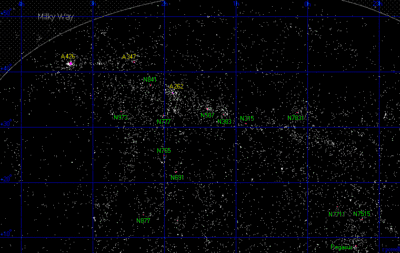Perseus-Pisces Supercluster
The Perseus-Pisces Supercluster (SCl 40) is one of the largest known structures in the universe. Even at a distance of 250 million light-years, this chain of galaxy clusters extends more than 40° across the northern winter sky. The Perseus-Pisces Supercluster is one of two dominant concentrations of galaxies (the other being the Local supercluster) in the nearby universe (within 300 million light years). This supercluster also borders a prominent void, the Taurus Void, and is part of the Perseus–Pegasus Filament which stretches for roughly a billion light years.[1][2][3]
| Perseus-Pisces Supercluster | |
|---|---|
 A map of the Perseus-Pisces Supercluster | |
| Observation data (Epoch ) | |
| Constellation(s) | Perseus, Pisces |
| Right ascension | 01h 50m |
| Declination | +36° 00′ |
| Distance (co-moving) | 76.7 Mpc (250 Mly) |
Clusters
The main clusters of the Perseus–Pisces Supercluster are Abell 262, Abell 347, and Abell 426.
References
- "Superclusters - Large Scale Structures". science.jrank.org. Retrieved 25 May 2017.
- "Astronomy & Cosmology - Large Scale Structure of the Universe". whillyard.com. Retrieved 25 May 2017.
- 'Astrophysical Journal', Part 1 (ISSN 0004-637X), vol. 299, Dec. 1, 1985, p. 5-14. "A possible 300 megaparsec filament of clusters of galaxies in Perseus-Pegasus" 12/1985 Bibcode:1985ApJ...299....5B
This article is issued from Wikipedia. The text is licensed under Creative Commons - Attribution - Sharealike. Additional terms may apply for the media files.